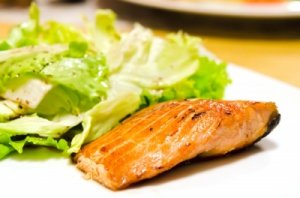Wish to get pregnant faster? Eat mediterranean diet!
Countless women of 35 and above worry about how to get pregnant faster. When biological clock starts ticking its last years, women have no choice but to wish to have a first baby quickly, then wait a short time between pregnancies and complete their family as soon as possible. I know that because I’ve been there myself.
What foods to eat to become more fertile?
To help shorten time to pregnancy, it may be a good idea to opt for Mediterranean diet which is believed to help women get pregnant faster.
This nutrition style has a solid scientific basis and a proven record of benefits. One study, published in Fertility and Sterility in 2010, found that the Mediterranean dietary pattern, when applied six months before conception, significantly increased the chance of pregnancy in 166 Dutch couples undergoing IVF treatments.
The couples were asked to answer questions related to their nutrition and lifestyle; on analysis, it turned out that a high intake of vegetable oils, vegetables, fish, legumes, and a low intake of snacks during preconception times, positively correlated with their blood folate and B6, and increased the probability of a couple conceiving a baby.
Would you like to talk to me or find out what I think of your fertility journey? You can meet me on Skype or send me an email.
Mediterranean Diet for Fertility
As a reminder, a Mediterranean diet features mostly fresh foods that have gone through minimal processing.
- Typical vegetables are: tomatoes, broccoli, peppers, potatoes, onions, peas, artichokes, eggplant, celery, lettuce, and mushrooms.
- Fruits recommended in the Mediterranean diet are: apples, grapes, grapefruit, melons, cherries, dates, peaches, and strawberries.
- Milk, yogurt, and cheese are OK. Processed carbohydrates are not recommended (white bread and pasta), but eating whole grains instead, such as rice, oats, couscous, barley, and bulgur is encouraged.
Scientists have proved that monounsaturated fat is highly beneficial for women wanting to get pregnant faster, which is found mostly in olive oil, various fleshy green fruits like avocados, also in nuts like cashew, peanuts and almonds. The regular consumption of this monounsaturated fat triply increases the chance of conceiving in women, while much intake of saturated fats in the form of red meat and various dairy products may have harmful effects on women’s chance of conceiving as their fertility can be adversely affected.
The Mediterranean diet is especially recommended for women who are in fertility treatmens.
Research data support that women living mainly on Mediterranean or other closely related type of diet, consisting of lean protein, fresh green fruits and vegetables, whole grains and healthy olive oil containing monounsaturated fats, face fewer health issues, including infertility.
This type of diet decreases the sugar level of the blood, thus reducing the chance of diabetes which is one of the main factors for infertility in women; as insulin controls most of the reproductive hormones of the body. Steady supply of Mediterranean foods like tomato, broccoli, spinach, whole grains pasta, and olive oil is beneficial for the unborn child and provide enough folic acid for its developing nervous system.
Why Mediterranean diet helps to get pregnant?
One of the prime suspects for the effects of wine and success of the Mediterranean diet is an ingredient called resveratrol.
Whether resveratrol acts independently, or if it’s the mixture of foods and compounds that makes the Mediterranean magic, science still needs to find out.
The fact is, resveratrol supplement (like this one for example) has amazing anti-oxidative properties and improves cellular energy status. Most of the studies with resveratrol to date have been done on animals – pigs, mice, and cats, with an almost invariable effect: intake over a longer time protected against the age-associated reduction of fertility, by means of improving egg and embryo quality.
Resveratrol is one of the prime suspects for the effects of wine and success of the Mediterranean diet.
One Mediterranean meal a day is not enough. Women who really wish to maximize their egg health should ideally eat several varieties of vegetables per day; also two to three types of fruits everyday; minimum two servings of fish per week and small amount of nuts as snacks inbetween meals. They need to exercise regularly, spend as much time as possible outside, and keep their weight at a normal range according to their age.
References:
- Eaton SB, Konner M, Shostak M. Stone agers in the fast lane: chronic degenerative diseases in evolutionary perspective.Am J Med. 1988 Apr;84(4):739-49.
- http://www.mayoclinic.com/health/mediterranean-diet/CL00011
- Juhl M, Olsen J, Andersen AM, Grønbaek M. Intake of wine, beer and spirits and waiting time to pregnancy. Hum Reprod. 2003 Sep;18(9):1967-71.
- Sofi F, Abbate R, Gensini GF, Casini A. Accruing evidence on benefits of adherence to the Mediterranean diet on health: an updated systematic review and meta-analysis.Am J Clin Nutr. 2010 Nov;92(5):1189-96.
- Toledo E, Lopez-del Burgo C, Ruiz-Zambrana A, Donazar M, Navarro-Blasco I, Martínez-González MA, de Irala J. Dietary patterns and difficulty conceiving: a nested case-control study. Fertil Steril. 2011 Nov;96(5):1149-53.
- Twigt JM, Bolhuis ME, Steegers EA, Hammiche F, van Inzen WG, Laven JS, Steegers-Theunissen RP. The preconception diet is associated with the chance of ongoing pregnancy in women undergoing IVF/ICSI treatment. Hum Reprod. 2012 Aug;27(8):2526-31.
- Vujkovic M, de Vries JH, Lindemans J, Macklon NS, van der Spek PJ, Steegers EA, Steegers-Theunissen RP. The preconception Mediterranean dietary pattern in couples undergoing in vitro fertilization/intracytoplasmic sperm injection treatment increases the chance of pregnancy.Fertil Steril. 2010 Nov;94(6):2096-101.











